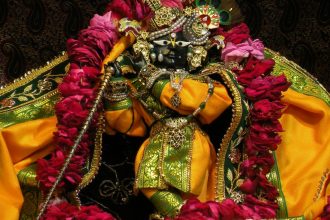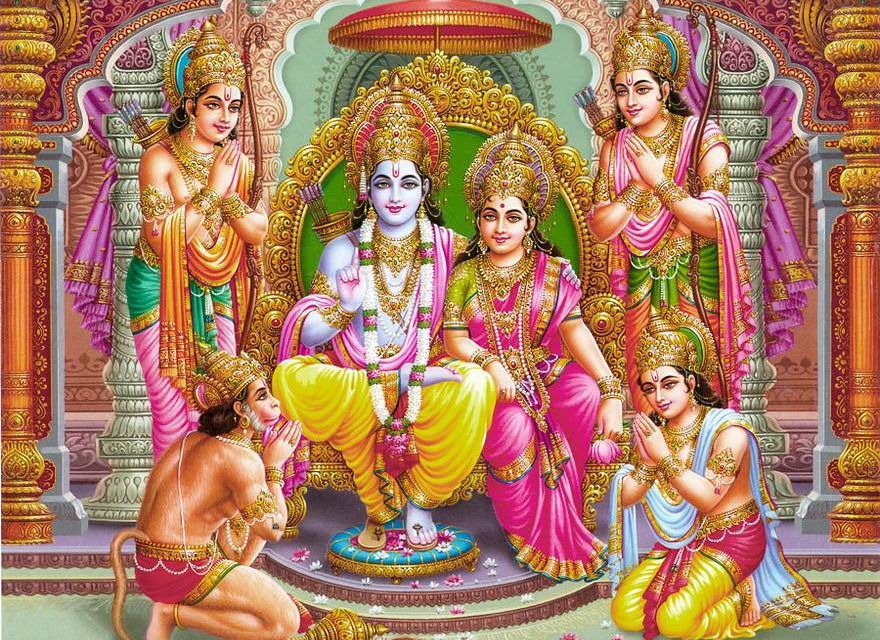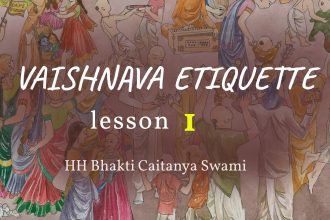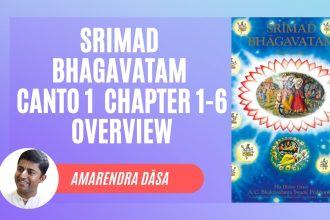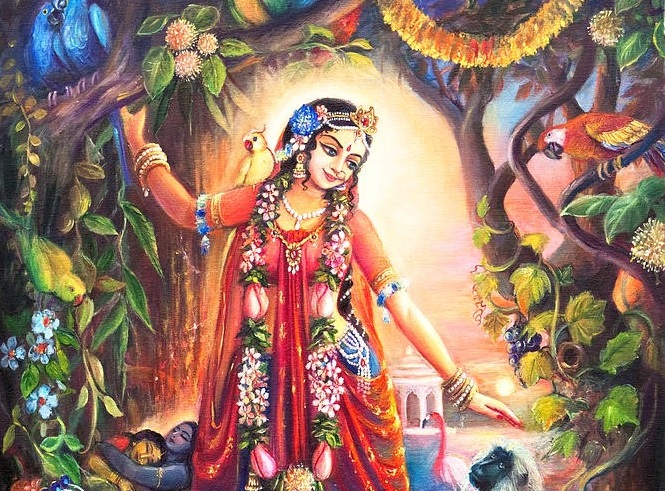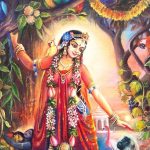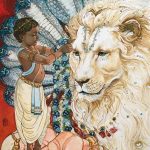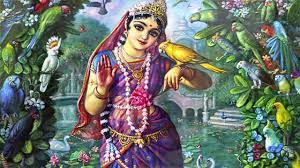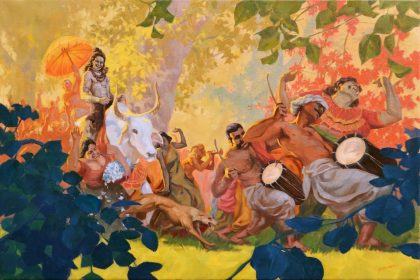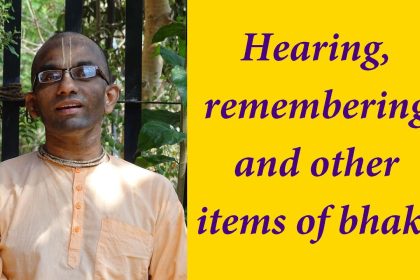Lord Hari continued…
“As for Me, by your curse, I will become a stone and remain close to the bank of the Gaṇḍakī River. Millions of vajrakīṭa worms, with their sharp teeth, will make convolutions or rings in the stones there, representing Me. These will be known as Śālagrāmas or sacred stones.
“Those stones which have one entrance hole, four rings, are marked with a garland of wild flowers, and look like a fresh rain cloud, will be known as Lakṣmī-Nārāyaṇa mūrtis or forms.
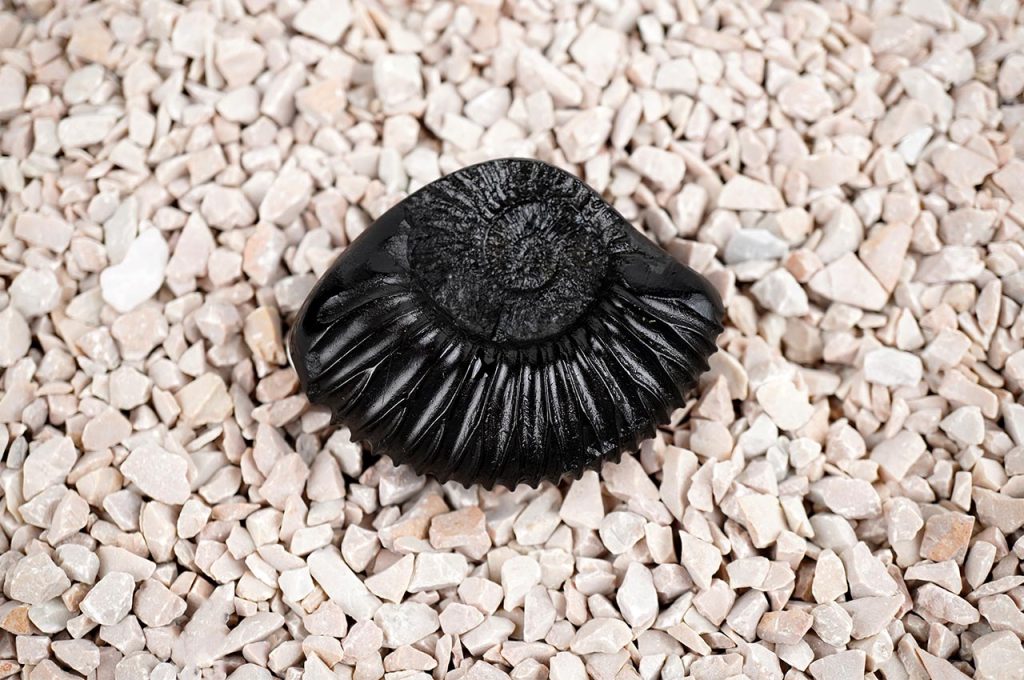
“Those stones that have one entrance hole, four rings, look like fresh rain clouds but have no garland mark will be called Lakṣmī-Janardana cakras.
“Those that have two entrance holes, four rings, are impressed with the marks of cow-hooves but have no garland mark, will be called Raghunātha cakras.
“Those that are very small, have two rings, look like fresh rain clouds but have no garland mark will be called Vāmana cakras. They shall be auspicious to householders.
“Those stones that are very small, have two rings and a garland mark will be called Ṣrīdhara cakras. They will bring prosperity to householders.
“Those stones that are large, circular, have two rings but no garland mark will be known as Dāmodara cakras.
“Those that are medium-large, have two rings, have the marks of arrows and quivers will be known as Raṇa-rāma cakras.
“Those that are medium-sized, have seven rings, and have the marks of an umbrella and ornaments will be called Rājarājeśvara (king of kings) cakras, and give royal prosperity to the people.
“Those that are large, have fourteen wheels, look like fresh rain clouds will be called Ananta cakras. They will bestow the fourfold fruits-artha, kāma, dharma and mokṣa (wealth, pleasure, righteousness and liberation).
“Those that are spherical, beautiful, medium-large, have two rings, look like rain clouds, and are marked with cow hooves will be called Madhusūdana cakras.
“Those that have one ring will be called Sudarśana cakras.
“Those that have their rings hidden will be called Gadādhara cakras.
“Those that have two rings and the face of a horse will be called Hayagrīvas.
“Those that have two rings, their mouths very wide and extended, and look very terrifying will be called Nṛśiṁhas. They will bestow detachment on their worshipers.
“Those that have two rings, extended mouths and garland marks (elliptical) will be called Lakṣmī Nṛśiṁhas. They will bestow blessings on the householders who worship them.
“Those that have, near their doors, two rings that are of equal size and beautiful, with manifested marks, will be known as Vāsudevas. They will fulfill all desires.
“Those that have a thin ring, look like fresh rain clouds, and have many fine holes within their wide gaping facets will be called Pradyumnas. They will give happiness to all householders.
“Those whose rings are united and whose backs are capacious will be called Saṅkarṣaṇas. They will always bestow happiness to householders.
“Those that look yellow, round and very beautiful will be known as Aniruddhas. They also will give happiness to householders.
“Wherever there are Śālagrāma stones, Lord Hari Himself exists. And wherever Lord Hari is, Goddess Lakṣmī and all the holy places also exist.
“By worshiping the Śālagrāma-śilā (stone), one destroys the sin of having killed a brāhmaṇa and any other type of sin.
“By worshiping Śālagrāma stones of the following shapes, the following effects take place:
“If the stone looks like an umbrella, one may obtain a kingdom.
“If the stone looks round, great prosperity.
“If it is cart-shaped, miseries.
“If its ends are spear-shaped, death.
“If its facets are distorted, poverty.
“If it is yellow, evils and afflictions.
“If its rings look broken, diseases.
“If its rings are split into fragments, certain death.
“If one observes vows, offers gifts, consecrates a temple, performs śraddha or funeral ceremonies, or worships the demigods before the Śālagrāma-śilā-all these acts become highly exalted.
“If one worships the Śālagrāma-śilā, one acquires the merits of bathing in all the tīrthas (holy rivers) and being initiated into all the Vedic sacrifices.
“Furthermore, one acquires all the merits acquired by performing all the Vedic sacrifices by visiting all the holy places, by fulfilling vows, by practicing all austerities and by reading all the Vedas.
“Whoever performs his abhiṣeka (bathing) ceremony always with Śālagrāma water-being sprinkled with this water at the initiation and installation ceremonies-acquires the spiritual merits gained by offering all sorts of gifts and walking around the entire earth.
“Without a doubt, the demigods are pleased with the person who daily worships the Śālagrāma-śilā. He becomes so holy that even all the holy places desire his touch. He becomes a jīvan-mukta (liberated while in his physical body) and very godly. Ultimately he goes to Vaikuṇṭha and serves Lord Hari there eternally. Any sin, such as the killing of a brāhmaṇa, flies away from him just as snakes flee at the sight of Garuḍa (Lord Viṣṇu’s eagle carrier). The earth is consecrated by the dust of his feet. By his birth, he redeems one hundred thousand of his ancestors.
“Anyone who, while dying, drinks the Śālagrāma-śilā water, will be freed from all his sins and go to Vaikuṇṭha. He becomes completely freed from the effects of karma (material action and reaction) and, without a doubt, becomes forever absorbed in the vision of Lord Viṣṇu’s feet.
“Anyone who lies while holding the Śālagrāma in his hands goes to Kumbhīpāka hell for as long as Lord Brahmā is alive (311 trillion and 40 billion earth years).
“If one breaks his promise while holding the Śālagrāma in his hand, he goes to the Asipattra hell for one hundred thousand manvantaras.
“He who worships the Śālagrāma-śilā without offering Tulasī leaves on it, or who separates the leaves from the stone, will have to suffer separation from his wife in his next birth.
“And if one does not offer the Tulasī leaves in a conch, he remains without his wife for seven births and becomes diseased.
“He who maintains the Śālagrāma-śilā, the Tulasī, and the conch in one place, becomes very dear to Lord Nārāyaṇa.
“It is painful for a person to separate from his beloved, whose company he once enjoyed. You were the dearmost of Śaṅkhacūḍa for one manvantara, so it is now very difficult for you to separate from him.


